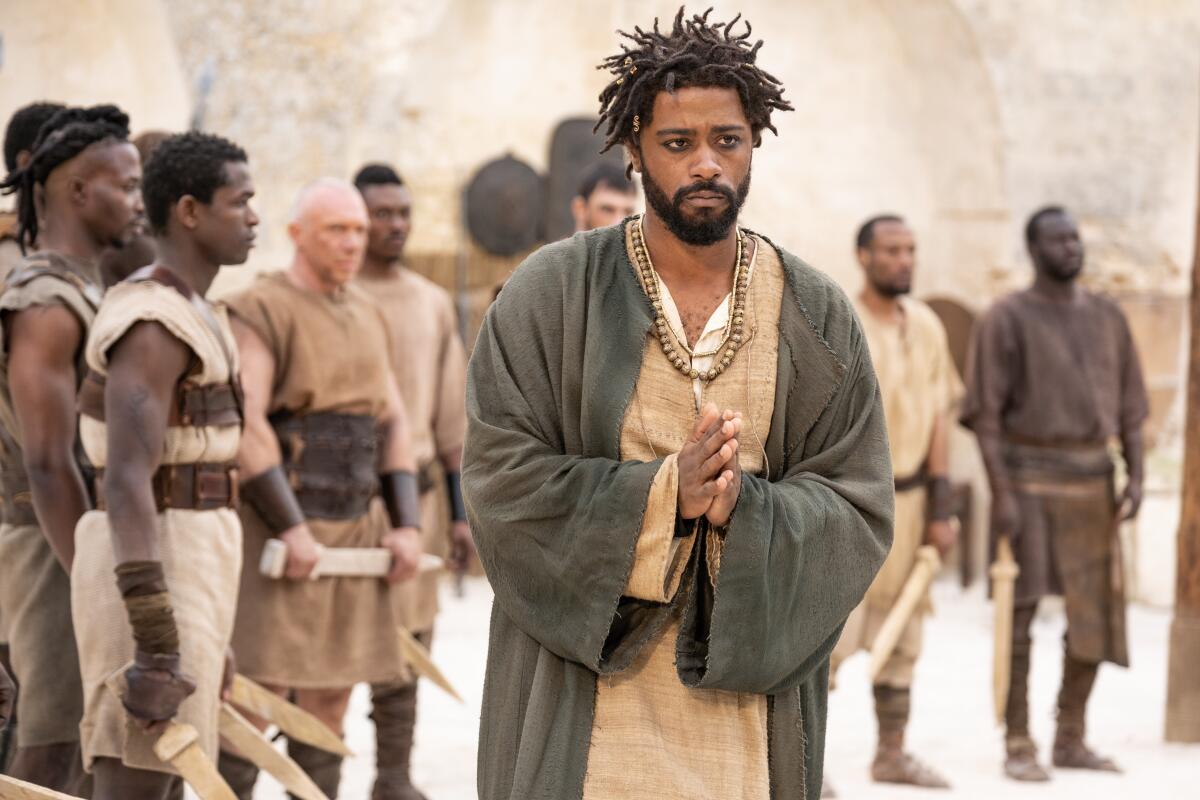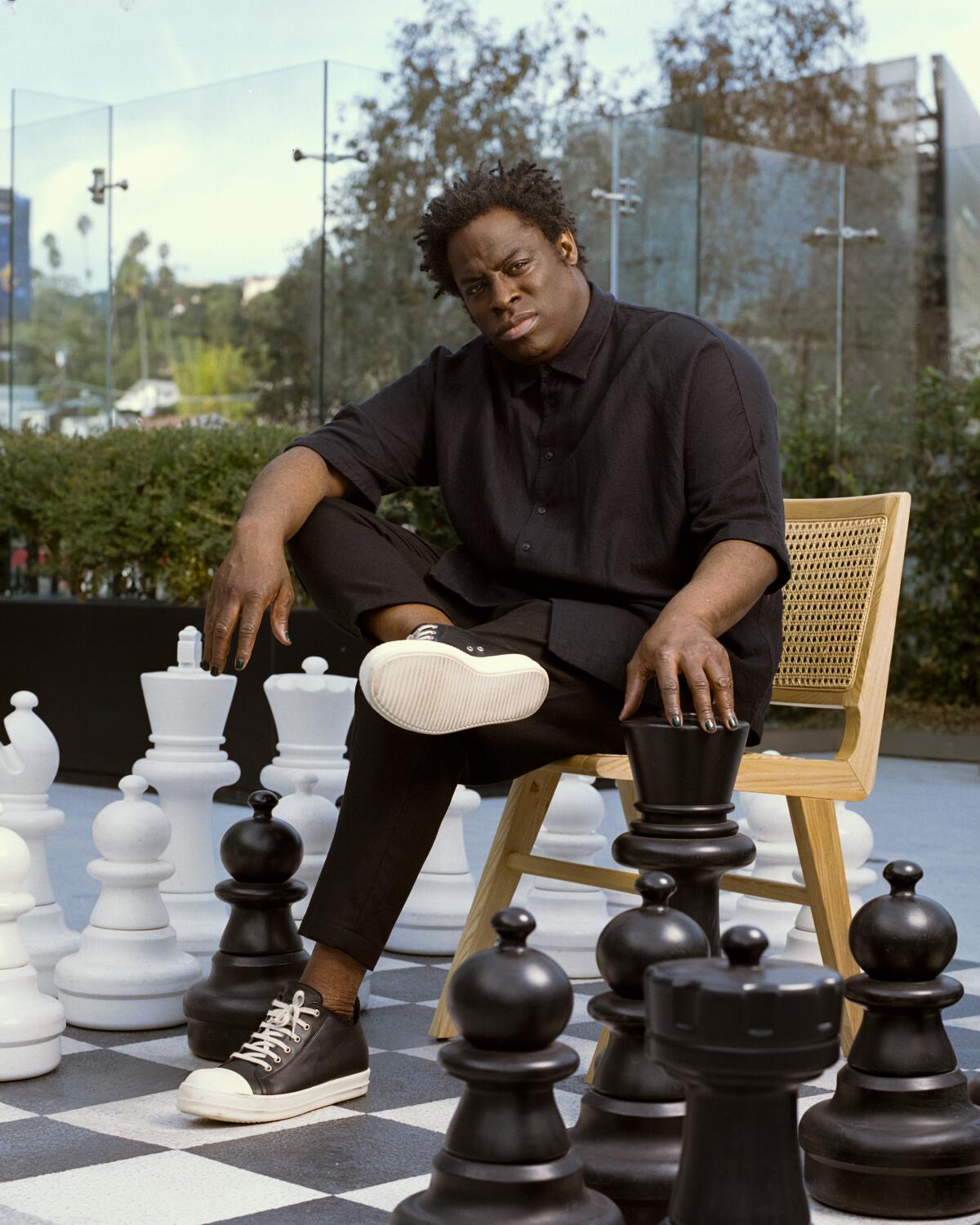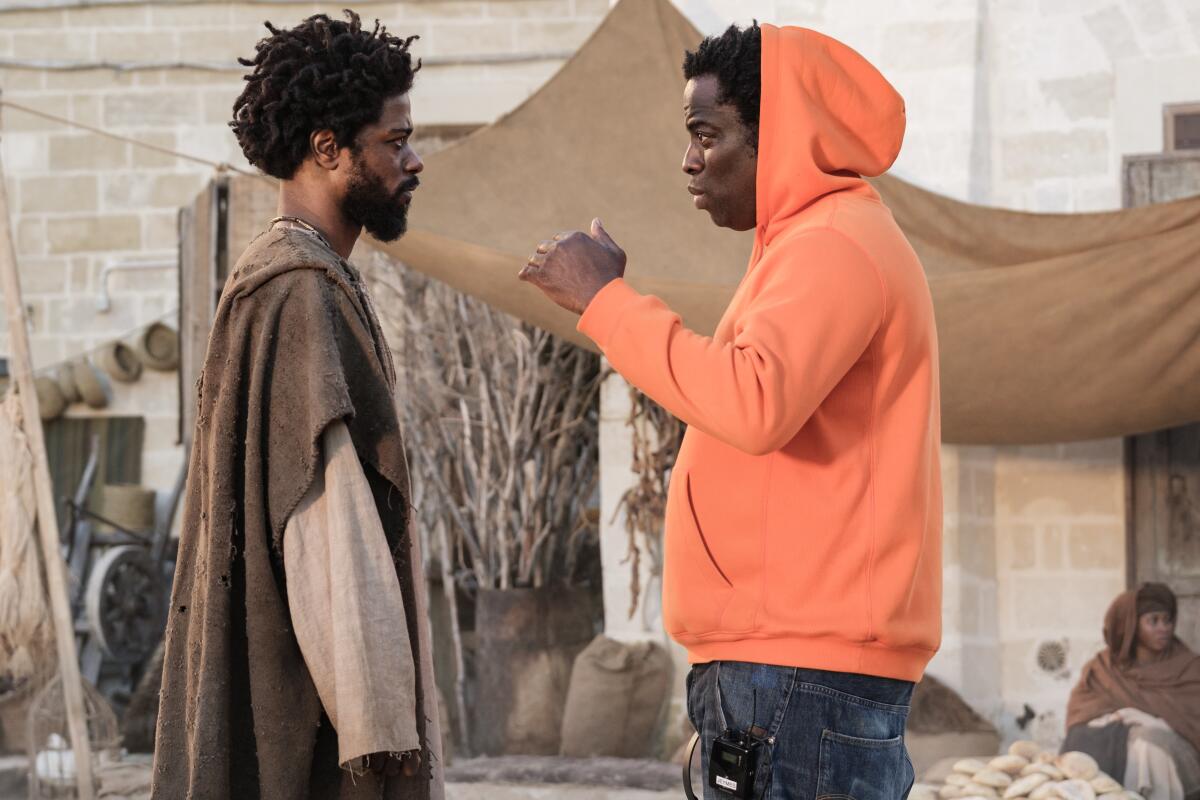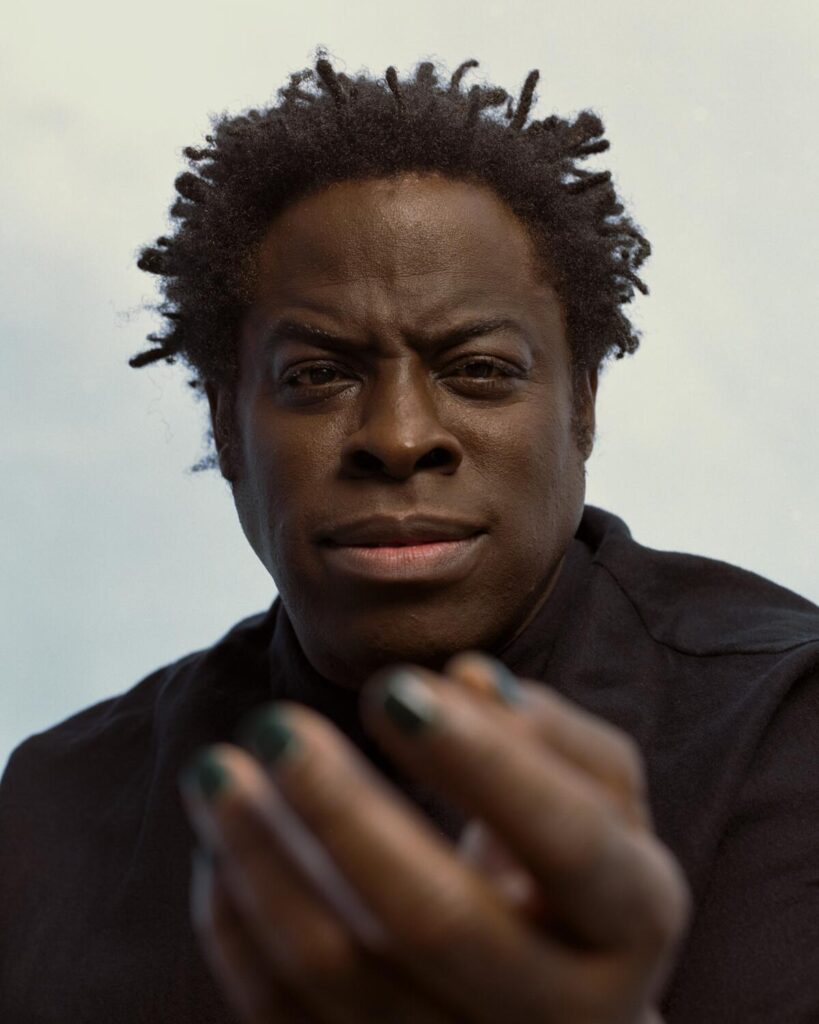Filmmaker Jeymes Samuel, photographed at the London West Hollywood in December.
(Darren Vargas / For The Times)
Jeymes Samuel doesn’t just make movies — he writes, directs and scores them. Forget “auteur.” He’s a cinematic trinity. Each of his two features, 2021’s revisionist western “The Harder They Fall” and now “The Book of Clarence,” a new twist on the old biblical epic in wide release Friday, is told with Samuel’s voice in almost every possible expression, from the words to the camera movements to the lyrics of several numbers. He wrote 11 original songs for the film and he sings on all of them.
“A lot of people pretend to be fearless in their work and have 100% belief in what they’re doing,” says Jay-Z, Samuel’s friend and producer on both films. “And we all waver and think: Is this right? I don’t know if I’ve ever seen Jeymes waver. Which is infectious.”
Samuel, 44, is an animated cyclone of exuberant energy. He wears a shirt with big block letters shouting his mantra: “OBEY YOUR CRAZY.” Larger than life at 6-foot-2, he has an enormous smile and giant hands that are quick to dap you or wrap you in a bear hug. Over coffee in a swanky Beverly Hills hotel, he breaks into song to demonstrate a point or reference a Prince jam or a classic film score — and, being the younger brother of Seal, his voice is silky, smoky silver.
A West Londoner of Nigerian and Afro-Brazilian descent, Samuel isn’t shy about his inspirations, which, in the new film, range from “Quo Vadis” to the sitcom “Taxi.” They’re all filtered through his unique mind, eye and vocal cords with the final goal, as Samuel puts it, “to be as Jeymes as possible.” That starts with the declamatory choice to populate historically white genres with predominantly Black casts. On his film sets — “Clarence” was shot in Matera, Italy, doubling for Jerusalem circa the time of Christ — music blasts from giant loudspeakers in between takes, triggering breakout dance parties for cast and crew, with Samuel leading the way.
“I think there’s a child in Jeymes that’s very alive, that you can see,” says actor LaKeith Stanfield, who plays both Clarence and his twin brother Thomas in the new film. “It puts us all in this really jovial place. And to create from that place is a special thing.”

LaKeith Stanfield in the movie “The Book of Clarence.”
(Moris Puccio / Legendary Entertainment)
“Clarence” takes several pages out of Hollywood’s Golden Age epics like “Ben-Hur” and “Samson and Delilah,” blatantly opening with cards printed in a nostalgic typeface on scrolls and Samuel’s regal orchestral music harking back to the scores of Miklós Rózsa. The premise for this original story sprang from a New Testament reference to one of Jesus’ apostles, Thomas, as a “twin” — so Samuel invented a twin brother named Clarence who doesn’t believe Jesus’ claims and decides to get in on this messiah business himself, manufacturing miracles and preaching a gospel of knowledge.
On the surface, the movie seems like it’s going to be a “Life of Brian”-type farce, and it’s certainly full of jokes and anachronisms: Clarence smokes joints and a hookah, characters go into a Roman nightclub and dance to the 1981 funk banger “Nights Over Egypt,” and there’s a wild gag featuring Benedict Cumberbatch that’s too good to ruin. There’s also a Moog synthesizer and electric guitar prominently featured in the score, and ’70s split-screen and modern POVs for the opening chariot race.
Samuel argues that, as long as a filmmaker is true to the internal logic he sets for the world he’s building, it’s all fair game. “A blank page is the most beautiful thing ever,” he says. “We can set whole new rule books.”
But “Clarence” is also heartbreakingly sincere, with some serious plumbing of faith, commentary on systems of oppression and fathoms of emotion in Stanfield’s virtuosic double performance. The actor says he went even deeper than he planned. “Because of the freedom that Jeymes provides on set,” he says, “you feel at liberty to explore and what you can excavate from that is often really profound.”
At its heart, Samuel says, his film is about self-discovery and redemption. It’s also the story of the Jesus era told through a prism of modern-day Black identity — a movie in which two friends, minding their own business, are suddenly harassed by a Roman stop-and-search, and where a mother, watching her son get crucified, wails: “They always take our babies!”
“The reason I have so much fun in there,” says Samuel, “is because the hood is fun. Then it’s heartbreaking, right? So just before a drive-by happens, you’re cracking jokes, you’re having a laugh, doing all the silly things. Then the next minute, you’re at a funeral.”
It’s this complex brew of silly humor and Black joy, social gravity and real tragedy, erudite film references and guest bars by Lil Wayne, that help make up the one-of-a-kind Jeymes Samuel aesthetic. It’s a blender of his many influences — the “Taxi” homage can be seen in the opening credits — but taken somewhere completely, madly new.
Samuel’s recent explosion into Hollywood was preceded by his career as a hip-hop artist and producer under the moniker the Bullitts. (He met Jay-Z after doing string arrangements for one of the rapper’s tracks in 2010.) But Samuel always planned to make movies. He got a Super 8 camera when he was 7 and, as a young man, per his recollection, he would call up Pinewood Studios to ask for cans of unused film stock which he would use to make short films and music videos. (He made several with leftovers sent from the production of “The Mummy Returns.”)

Jeymes Samuel, photographed at the London West Hollywood in December.
(Darren Vargas / For The Times)
He’s a walking, singing film library, bouncing from 1970s cinematic references to Yul Brynner quotes and back again. It was his childhood obsession with old Hollywood westerns that made him dream up his 2013 concept album “They Die by Dawn and Other Short Stories,” which morphed into a short film starring Rosario Dawson and Michael K. Williams that Samuel financed himself and shot in four days.
When Baz Lurhmann asked Jay-Z to create the soundtrack for “The Great Gatsby” in 2013, the hip-hop mogul knew he had to enlist Samuel. They both realized they needed an original project that they could drive from beginning to end, and the result was “The Harder They Fall,” shot during the pandemic and starring an all-star cast including Idris Elba, Jonathan Majors and Regina King.
“I felt like he was making music to get to film,” says Jay-Z. “He was a filmmaker the whole time. But I guess all of it is parts of him. The music was like his jab and his dominant hand is to be a filmmaker.”
For Samuel, it’s all part of the same creative ecosystem. He likes to say he sees music and he hears film. When he’s writing a screenplay, he’s simultaneously coming up with musical themes for characters and scoring the movie. He came up with a different melody for Clarence and for Thomas, and gave them both to Stanfield before filming.
Jay-Z likens him to a kid who never lost that sense of “wonderment,” a time, he adds, “when our eyes are just wide to the world and everything’s possible. It’s like you’re hearing someone’s dreams and it’s manifesting right in front of you.”

LaKeith Stanfield, left, and director Jeymes Samuel on the set of “The Book of Clarence.”
(Moris Puccio / Legendary Entertainment)
Stanfield, who also starred in “The Harder They Fall,” says he’s never once seen Samuel’s energy dip. “The only time his energy shifted was when he was eating and that was just because he couldn’t talk,” the actor says.
Samuel has been bursting for this opportunity his entire life. He first came up with the idea (and one of the songs) for “The Book of Clarence” in 2004, when he was 24 and still “just kind of finding who I was as a human being. Still finding myself. Still ignoring all the voices in my head and outside of it that would say I should be doing something else with my life — not music and film.”
He’s already cooking up at least three more film ideas in his head (no hints from him), and has a producer in Jay-Z eager to take the risk, plus a cast of disciples who would follow him anywhere.
Sometimes, Samuel admits, he second-guesses his own ideas. “You find your pen wrestling with your own mind when you’re writing,” he says. “But you just have to remind yourself that you’re telling the story that you want to hear. You’re directing the movie that you want to watch.”
Suffused with personality, “The Book of Clarence” could only have made by one man. That takes a kind of faith, and Jeymes Samuel seems to have it in abundance.

